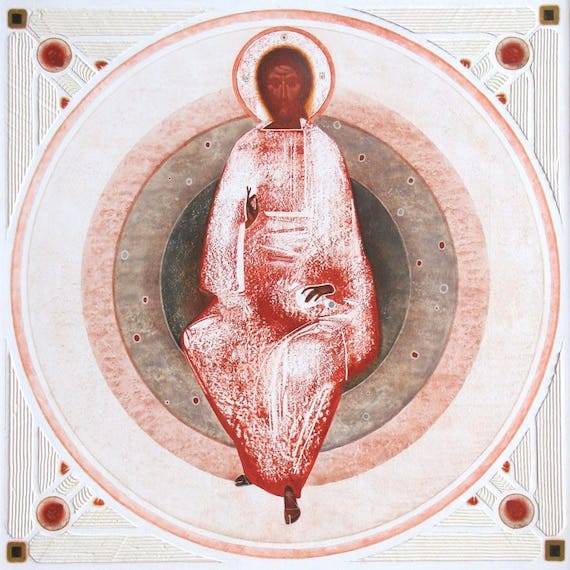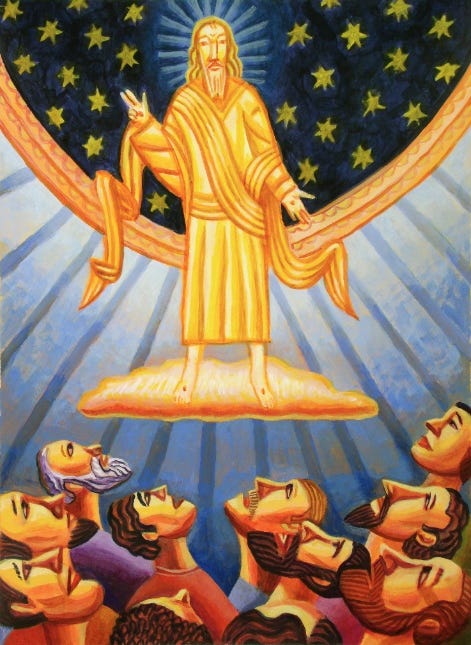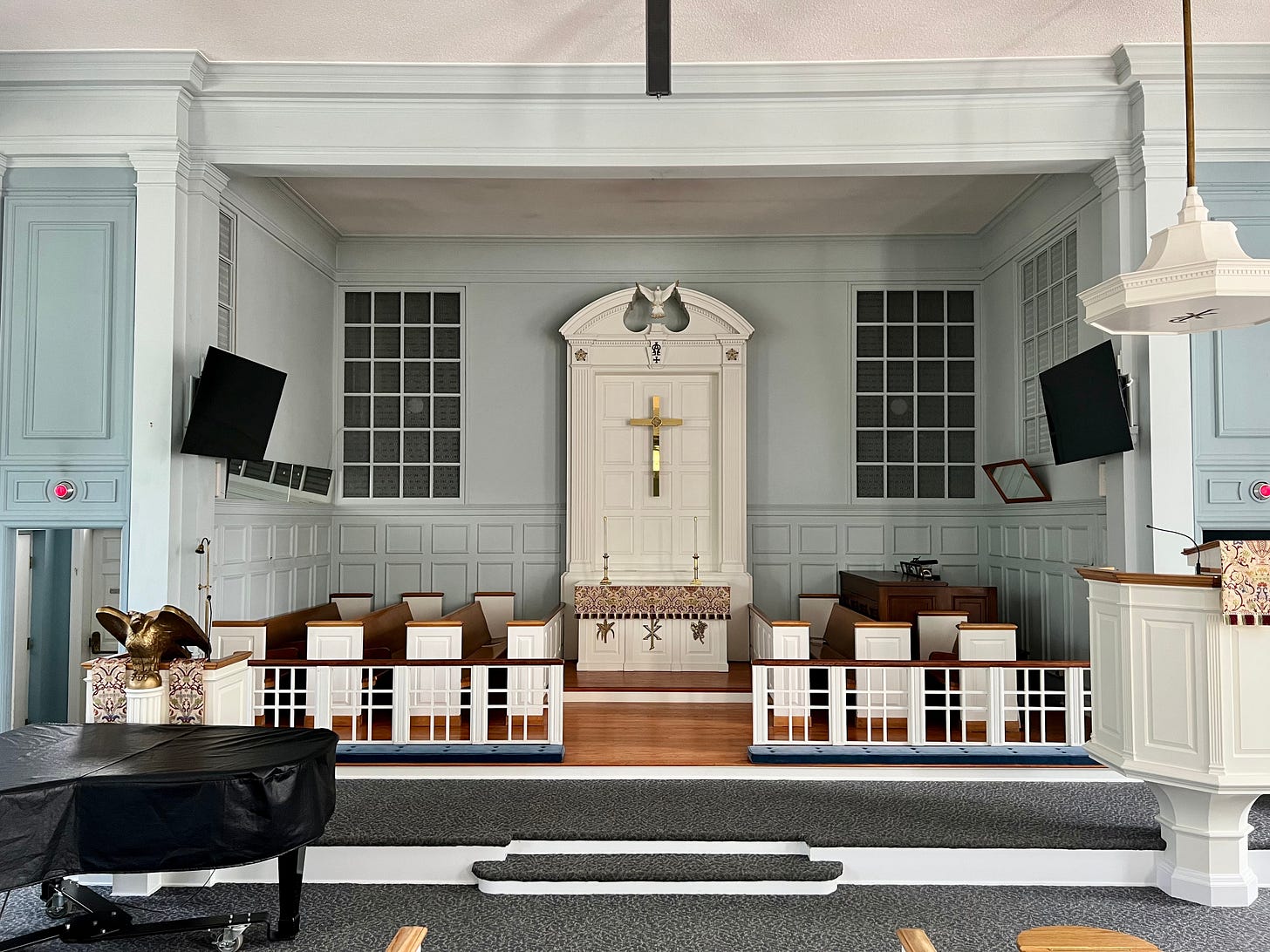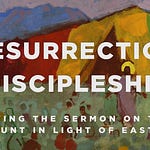May 12, 2024
Ascension Sunday
Luke 24:44-53

I have been thinking a lot lately about why we do what we are doing right now. Why do we gather on Sunday mornings? Why do we sit on uncomfortable pews – a glorified bench – when we have comfortable couches and chairs at home? Why do we subject ourselves to preaching, hymns, and prayers when, theoretically, we can listen to a sermon from home or while on a run? Hymns, why not just listen to the radio and sing along while we sit in traffic? And prayer, can we not pray anywhere, so why here? Why now?
Many of us attend church because that is what we have always done. Our parents made us attend church. When I was a kid, if I was not in the third pew from the front on the lectern side in the sanctuary at Calvary United Methodist Church in Frederick, MD, I had better have a good reason (like being dead). Perhaps you have a similar story.
We asked our parents, “Why do I have to go to church?”
“Because you live in my house, and in my house, we go to church.”
There was a time when being seen in church was the only way to do business or have a social life in the community. Imagine that; these wooden pews being a place of influence in the local business community, a place of influence in local politics.
Those are hardly theological reasons for showing up at 10:30 AM when you could be in a thousand other places.
Are you here because it’s a holdover habit from your childhood, because you’re looking for influence, or because you want your kids to be raised in the church? Those reasons do not bother me a bit. As one of you reminded me on Thursday night, my job as the preacher is to accept you as you are. If I were a preacher who judged his congregation and nitpicked everything you do, well, I wouldn’t have much of a congregation after very long. One of the reasons I am here, as your pastor and preacher, is to help you name why you are here. And I bet that if we peeled back the reasons, there just might be some theology hiding underneath whatever drove you to drive here this morning.
Today is Ascension Sunday. It is the Sunday we recall that Jesus ascended after spending time with the disciples after the resurrection. Luke tells us that before Jesus ascended, he offered the disciples peace[i] and calmed their fears by inviting the terrified men to touch his body. “Look at my hands and my feet; see that it is I myself. Touch me and see; for a ghost does not have flesh and bones as you see that I have.”[ii] Jesus ate “a piece of broiled fish”[iii] with the men.
We pick the story up today with Jesus teaching the disciples so they would “understand the scriptures.” [iv] Jesus told the disciples they were now witnesses to everything that had been revealed to them. Then, after Jesus did all of these things, he walked the disciples to Bethany, and there he ascended. He “was carried up into heaven.”[v]
If you open any of the gospels, any of Paul’s writings, or a random page in the Old Testament, you will notice that no matter what is going on, God is the One who gets the good verbs. What do I mean?
Before the ascension, the disciples were “terrified,”[vi] but before we are told the disciples “were startled and terrified,”[vii] Jesus said, “Peace be with you.”[viii]
It was Jesus who opened the disciples' minds so they would understand the holy scriptures.
As he ascended, Jesus offered a blessing.
In the story of the ascension, Jesus gets the good verbs.
We recall in our baptism and communion liturgies that God established the covenant with Moses, not the other way around. When Israel was enslaved in Egypt, God sent Moses. Moses did not act on his own agenda. When Israel arrived at the Red Sea's banks, the Lord parted the waters.
God established the line of David, and where David’s faithfulness faltered, God remained steadfast.
Ascension Sunday is one of those days on the church calendar that we can easily gloss over because the story is hard to believe or understand. After all, well, we were not there. We were absent when Jesus invited the disciples to touch his flesh and bone. We were not present when Jesus opened the disciples’ minds and revealed the fullness of the scriptures. We were not present in Bethany to receive the blessing as Jesus ascended to heaven.
The Ascension of Jesus is your story on a Sunday morning here at the Chapel.
Within church growth and development, some trends encourage churches to be “User-Friendly” or “Seeker-Friendly” churches meaning that the church exists (in part) to meet people's felt needs. In this mindset, when 10:30 rolls around and the first notes of the organ are played, we are the center of worship, what we want, what we prefer. We’re all here, so now, organist, start playing.
Worship, though, only begins when Jesus is here, when he stands among us. When Jesus says, “Look at my hands and my feet; see that it is I myself. Touch me and see; for a ghost does not have flesh and bones as you see that I have.”[ix] Jesus is offering us peace amid a world that leaves us unsettled and terrified. Christ is extending an invitation to live in the light of the resurrection.
Life in the light of the resurrection is realizing that things happen when Jesus stands among us. Sunday happens because Jesus stands among us. While we may not have been there in Bethany, we are still, nonetheless, witnesses to Christ resurrected. Like the first disciples, you are here, if for no other reason than because Jesus called you.
Naming why we are here on Sunday morning and naming a reason other than Jesus, is the byproduct of a time when we think less and less theologically and more and more practically. We look for the practical in much of what we do and when practicality becomes our priority, we give ourselves the good verbs. We become the heroes of the story, which means that when Sunday comes around, we gather for reasons other than the fact that Christ has called each of us.
Because Jesus gave the disciples everything they needed to turn their doubts and fears into praise and worship – peace, revelation, assurance, and blessing – we can rest assured that when we are in need, Christ will give us what we need. Recently, I noticed that when someone approached Jesus with doubt, he did not rebuke them. “Doubting Thomas” was not rebuked. Even those who doubted Jesus and sought to challenge him were given what was needed that they believed.
“You need proof? Physical, tangible, empirical proof? Cool. Touch my skin. Feel my bones. I’m hungry. Pass me some of that fish and watch me eat.”[x]
We are here this morning not so that we will have all of our suspicions answered or to have confirmed what we already know. The stories we read, the songs we sing, and the prayers we pray are common knowledge even for those who are not here on Sunday morning. So, I ask again, why are we here? We are here because, like the first twelve, we as witnesses to Christ's works in the world. Perhaps the real test of a Sunday morning is not how or why you arrived but how you will leave.
Later this afternoon or maybe tomorrow, someone will ask, “How was church?” And, you may struggle to find the words. Remember what Jesus told the disciples, “You are witnesses.”[xi] Witnesses tell the court what has happened. The witness declares what is true in the world by what the witness has seen and heard. So go, tell the court of the world what you have seen. Tell the world what life in the light of the resurrection looks like. Be a witness that gives the good verbs to God so that, in hearing, the world will know that our ascended Lord has not abandoned, still invites us to experience his grace, and in experiencing his grace promises that we will never be the same.
[i] Luke 24:36
[ii] Luke 24:39
[iii] Luke 24:41
[iv] Luke 24:45
[v] Luke 24:51
[vi] Luke 24:37
[vii] Ibid.
[viii] Luke 24:36
[ix] Luke 24:39
[x] Luke 24:39-43, The Teer Hardy International Translation
[xi] Luke 24:48


















Share this post